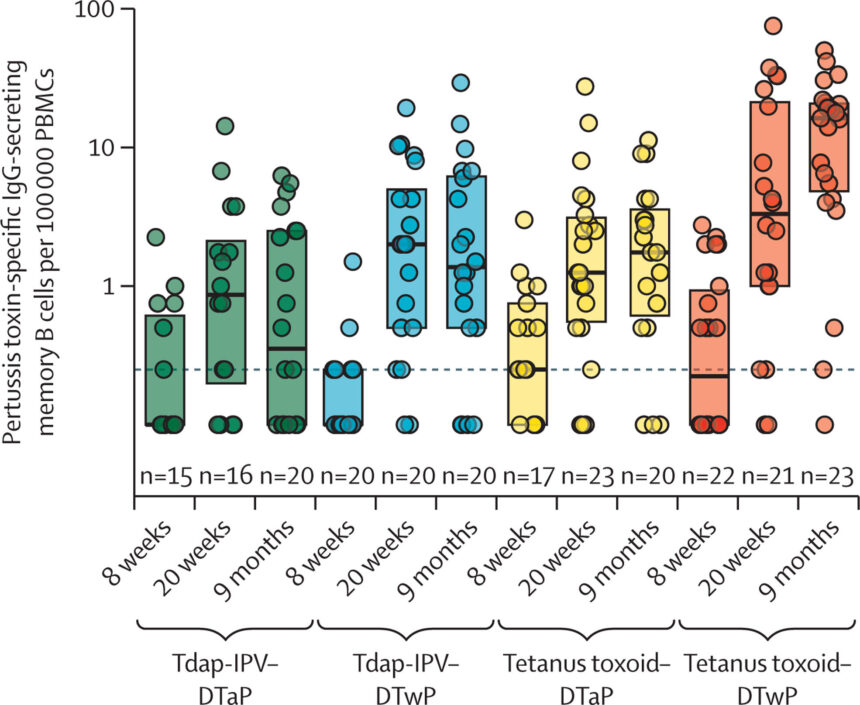Pertussis Vaccination During Pregnancy Boosts Baby’s Immunity
Researchers at the University of Turku have conducted a study showing that vaccinating women with acellular pertussis vaccine during pregnancy boosts the quantity and quality of pertussis-specific antibodies in the early life of infants.
Key Findings:
- Study Design: A randomized, controlled, double-blind, phase 4 trial was conducted in the Gambia to evaluate the effect of pertussis immunization in pregnancy on the immunogenicity of primary acellular or whole-cell pertussis vaccines in a west African cohort.
- Publication: The study was recently published in The Lancet Infectious Diseases.
Pertussis: A Highly Contagious Respiratory Disease
Pertussis is a highly contagious respiratory disease caused by Bordetella pertussis bacteria. Despite extensive vaccinations, the disease has resurged. The World Health Organization estimates that there are 16 million cases annually and approximately 195,000 deaths in children globally. After the COVID-19 pandemic, pertussis has made a spectacular comeback in Europe and many other parts of the world.
Pertussis Vaccines:
- Types: Two types of pertussis vaccines are currently used: whole-cell vaccines (wPVs) and acellular vaccines (aPVs).
- Usage: Whole-cell vaccines are used in many low- or middle-income countries, while acellular vaccines are used in high-income countries for primary vaccination. For booster vaccinations in adolescents and adults, only acellular vaccines are used.
Immunization in Pregnancy:
- Recommendation: Since the highest incidence and mortality of pertussis occur in infants, especially those too young to be vaccinated, immunization in pregnancy (IP) is recommended to protect infants in early life against pertussis.
- Blunting: Studies have shown that IP can decrease the antibody responses of infants to their primary diphtheria-tetanus-acellular pertussis (DTaP) vaccination, a phenomenon called "blunting." However, the short-term and long-term implications of blunting remain unclear.
Study Details:
- Participants: The study was conducted in the Gambia.
- Findings: Vaccinating women with diphtheria-tetanus-acellular pertussis vaccine in pregnancy was safe and well tolerated, and it boosted the quantity and quality of pertussis-specific antibodies in infants in early life.
- Blunting: Although Tdap-IPV (Tetanus, diphtheria, acellular pertussis, polio vaccine) was associated with relative blunting of the immune response to the DTwP (Diphtheria-Tetanus-whole-cell pertussis) primary vaccination series, pertussis-specific antibody quality and memory B-cell responses were preserved.
Conclusion:
The study highlights the importance of maternal immunization during pregnancy to protect infants from pertussis. The functional antibody assays developed in Turku are being used in various vaccine studies around the world.
Further Reading:
- Full Article: Anja Saso et al., The effect of pertussis vaccination in pregnancy on the immunogenicity of acellular or whole-cell pertussis vaccination in Gambian infants (GaPS): a single-centre, randomised, controlled, double-blind, phase 4 trial, The Lancet Infectious Diseases (2025). DOI: 10.1016/S1473-3099(25)00072-6
This document is subject to copyright. Apart from any fair dealing for the purpose of private study or research, no part may be reproduced without the written permission. The content is provided for information purposes only.
Reference : https://medicalxpress.com/news/2025-05-pertussis-vaccination-pregnancy-quantity-quality.html








